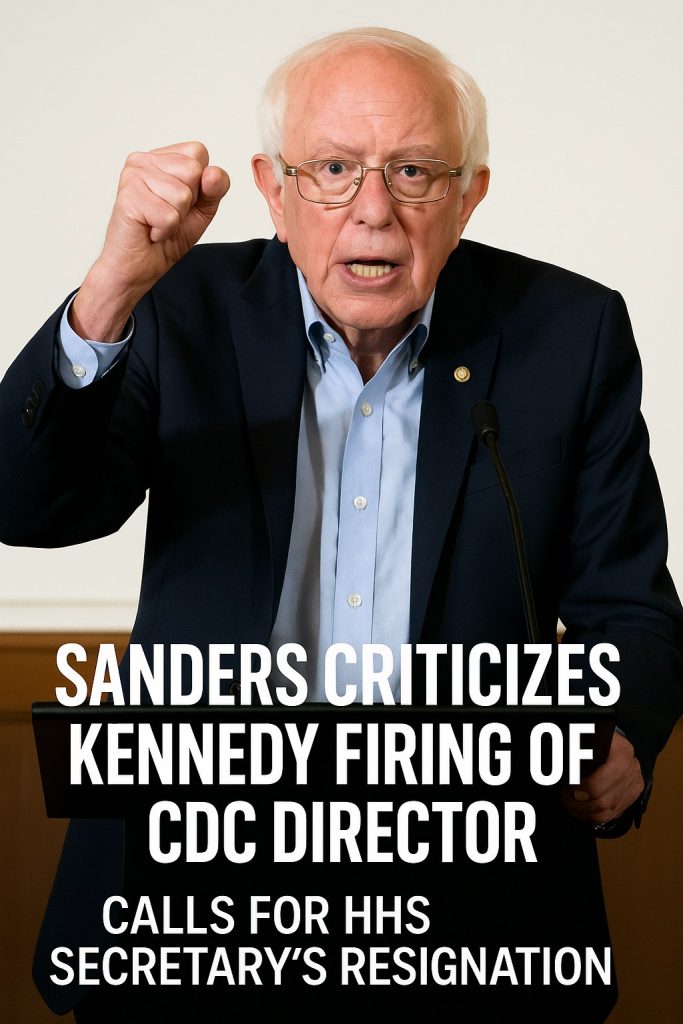Senator Bernie Sanders has launched a fierce critique against Health and Human Services (HHS) Secretary Xavier Kennedy following the sudden dismissal of Dr. Susan Monarez, the CDC director, in a dispute centered on vaccine availability. The incident has ignited a firestorm of debate regarding public health policy and governmental control over vaccine distribution in 2024.
Dr. Susan Monarez, widely respected within public health circles for her commitment to equitable vaccine access, was reportedly fired after she refused to comply with directives that would have limited vaccine availability to certain populations. According to informed sources, Monarez resisted internal pressures to restrict vaccines, advocating instead for broad and open access to bolster public immunity.
The dismissal prompted Senator Sanders to publicly denounce Secretary Kennedy’s handling of the situation, accusing him of prioritizing political considerations over the health and welfare of the American public. In a statement released shortly after the firing, Sanders asserted, “Secretary Kennedy’s decision to remove a capable and principled CDC director who stood firmly for vaccine accessibility is a grave mistake. This move jeopardizes public health and undermines trust in our nation’s ability to combat preventable diseases.”
The controversy revolves around conflicting views on vaccine distribution policy amid ongoing efforts to manage public health crises. While specific internal directives remain confidential, it is understood that Kennedy’s mandate included measures to control vaccine allocation, which Monarez viewed as detrimental to comprehensive public outreach and equitable protection.
Sanders’ call for Kennedy’s resignation is rooted in broader concerns about transparency and accountability within the Department of Health and Human Services. The senator emphasized that the firing reflects a pattern of suppressing expert voices and health officials who champion inclusive strategies in fighting infectious diseases.
“The integrity of our public health institutions depends on leaders who are committed to science and the equitable delivery of lifesaving interventions,” Sanders added. “When policies are dictated by political optics rather than public health needs, lives are put at risk. Secretary Kennedy’s refusal to support these principles makes him unfit to serve.”
In the wake of this incident, there has been a notable wave of response from health professionals, advocacy groups, and policymakers demanding greater clarity on vaccine policies and the criteria that led to Monarez’s termination. Many argue that the firing could discourage transparency and openness among scientists and health officials who often face pressure balancing science and policy.
As public conversations around vaccine hesitancy and disease prevention continue to evolve, this development brings to light the tensions between governmental oversight and frontline health leadership. The controversy also arrives at a critical juncture in 2024, as the nation navigates complex health challenges that require unified and evidence-based approaches.
Meanwhile, the HHS has yet to provide a detailed explanation for Monarez’s firing, nor has Secretary Kennedy responded publicly to Sanders’ calls for resignation. Observers anticipate increased scrutiny as both the Senate and the health community push for answers regarding the decision and its implications on national vaccine policy.
The firing of a CDC director over disagreements on vaccine access serves as a stark reminder of the delicate balance between political agendas and public health priorities—one that Senate voices like Sanders insist must be carefully managed in the interest of all Americans.



